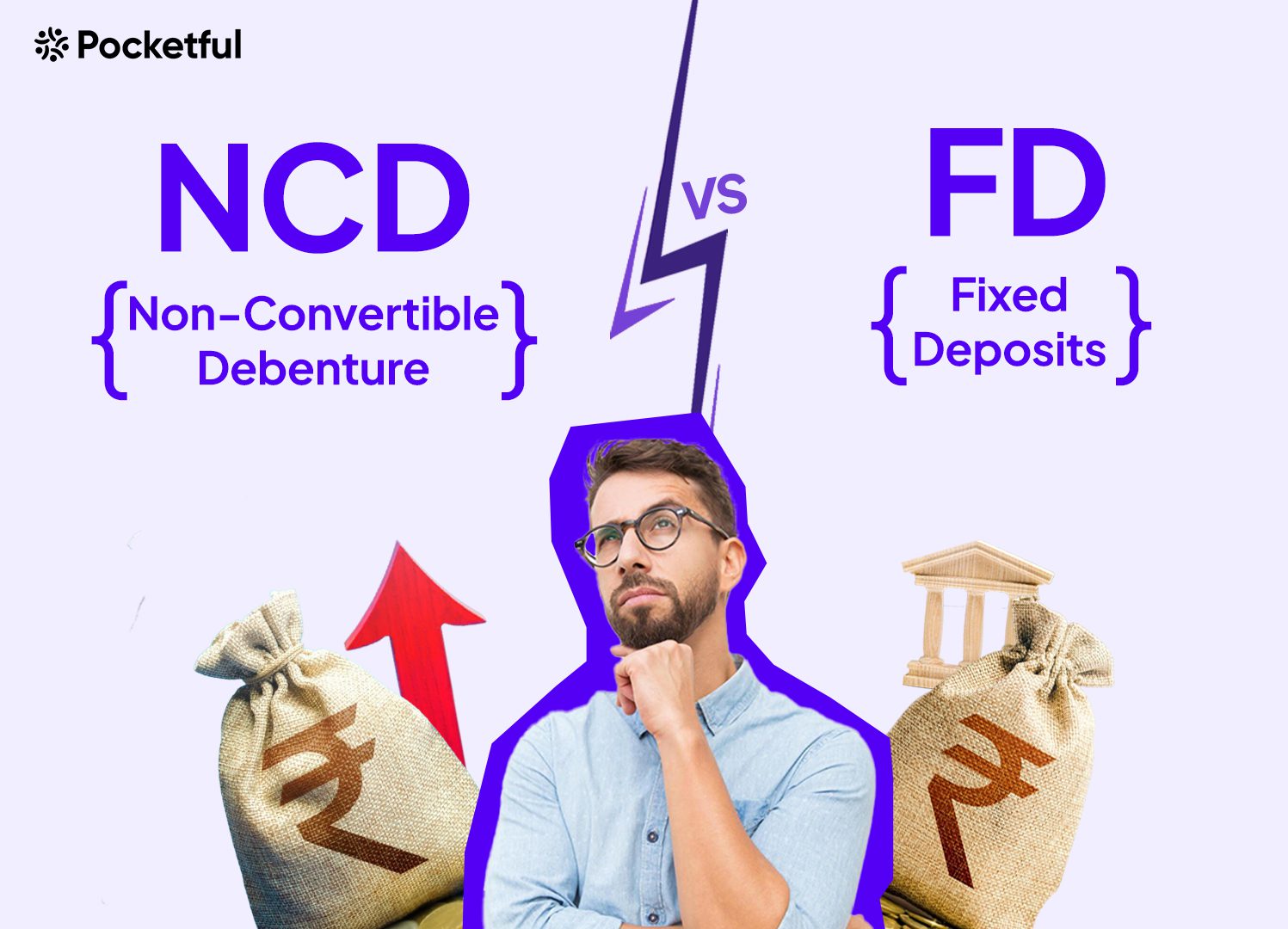| Type | Description | Contributor | Date |
|---|---|---|---|
| Post created | Pocketful Team | Mar-11-24 | |
| Add new links | Nisha | Mar-01-25 |

- Blog
- non convertible debenture ncd vs fixed deposit fd meaning features and differences explained
Non-Convertible Debenture (NCD) vs Fixed Deposit (FD): Meaning, Features, and Differences Explained

Are you unable to choose between putting your money into Non-Convertible Debentures (NCDs) and Fixed Deposits (FDs)? You’re not alone! Both options are popular among investors looking for safety and consistent returns, but they both come with their own sets of pros and cons. In today’s blog, we’re comparing NCDs with FDs.
Fixed Deposits – An Overview
It’s a well-known conventional investing choice for risk-averse investors. Fixed deposits are financial instruments offered to the general public by banks and non-banking financial organizations (NBFCs) that allow them to deposit money for a predetermined amount of time and receive a guaranteed fixed return. Both cumulative and non-cumulative options are available with the fixed deposit, giving investors the choice of receiving interest payments periodically or all at once when the fixed deposit matures.
Features of Fixed Deposits
1. The length of a fixed deposit may usually be chosen with flexibility; it can be anywhere from seven days to ten years.
2. Many banks provide an automatic renewal option that lets investors reinvest their money without having to go through any extra steps.
3. Fixed deposits often provide flexibility in the amount invested, with most banks allowing a minimum investment of INR 5000.
4. Fixed deposits are extremely low-risk investing options since they provide a guaranteed return.
5. Senior citizens benefit further from fixed deposit investments by earning interest rates higher than standard rates.

Read Also: A Guide To Fixed Deposits: Exploring Types And Interest Rates
Non-Convertible Debentures (NCDs) – An Overview
Debt instruments, known as NCDs, are issued by corporate entities to raise long-term capital from the general public. Investing in debentures entails lending money to corporate entities in exchange for a fixed interest rate for a predetermined length of time. The principal amount of the loan is repaid by the company on the maturity date.
Two forms of debentures exist: convertible debentures, which can be converted into equity shares of the company after a specific length of time, and non-convertible debentures, which cannot be converted into equity shares. NCDs are issued in the primary market initially, but they can also be traded in the secondary market, offering investors greater liquidity.
Features of NCDs
1. NCDs have a fixed interest rate that is set at the time of issue by the issuing firm.
2. An investor will get consistent, recurring income from NCDs.
3. NCDs are issued for a particular period, after which the principal amount is repaid.
4. Purchasing NCDs entitles you to become a creditor of the business, allowing you to make claims against its assets in the event of its insolvency.
5. Due to the high risk associated with investment in corporate houses, these NCDs are rated by the credit rating agencies based on the creditworthiness of the issuing company.

Difference between NCD and Fixed Deposit
We’ll now explain the distinction between a fixed deposit and an NCD.
Interest Rate – Fixed deposit interest rates typically range from 4 to 7% annually, whereas NCD interest rates often range from 8 to 10%.
Issuer – Corporations issue NCDs to generate capital, whereas banks or other financial organizations issue fixed deposits.
Risk – NCDs possess higher risk as private business houses issue them. As some business houses have low credibility, investing in their NCDs can put your money at higher risk. On the other hand, FDs are issued by banks and other financial institutions that the Reserve Bank of India regulates.
Liquidity – Investment in NCDs offers higher liquidity than Fixed Deposits as they can be traded in the secondary market. Still, no such benefit is available in fixed deposits, although a premature withdrawal option comes with a penalty.
Taxation – NCDs held by an investor in demat are exempted from tax deducted at source while keeping the NCD in physical form attracts TDS if the annual payout is more than 5000 INR. Interest earned from a fixed deposit is fully taxable as per your tax slab if it is above 40000 INR (50000 INR in case of a senior citizen) in a financial year.
Credit Rating – The rating of NCDs by credit rating agencies is mandatory, while the fixed deposits issued by the banks are not required to get rated by any agency; however, corporate fixed deposits issued by non-banking financial companies are required to get the rating from any credit rating agency.
Interest Rate Risk – As NCDs are tradable in the secondary market, their price may vary based on interest rates prevailing in the economy, while fixed deposits don’t have any such kind of risk.
Safety – Assets of the company generally back the issuance of NCDs while the fixed deposit issued by the bank is insured against the bank’s insolvency up to 5 lakh INR.

Read Also: Debentures: Meaning, Features, Types, Benefits and Risks
Conclusion
Investment in fixed deposit is suitable for the investor with lower risk-taking ability and is happy with a lesser return on their investment. At the same time, NCDs can be opted for by investors looking to earn some extra return and can take additional risk for that. Overall, the above comparison shows the features of both fixed deposits and NCDs.
On a short note, investors must consider their risk profile, investment goal & objective before deciding between fixed deposits and NCDs.
Frequently Asked Questions (FAQs)
Can I withdraw my investment from a fixed deposit before maturity?
Yes, you can withdraw your investment before maturity, but you need to pay some penalty to the issuing authority.
Can I sell NCDs in the secondary market?
Yes, after NCDs are issued in the primary market, they are listed in the secondary market like any other securities.
What is the shortest and longest duration for which an NCD can be issued?
NCDs cannot be issued for less than 90 days and more than 20 years.
What is the minimum and maximum duration for which a fixed deposit can be issued?
The fixed deposit can be issued for a period ranging from 7 days to 10 years.
Is investment in NCD better than investment in fixed deposits?
NCDs generally carry higher risk as compared to bank fixed deposits but offer higher returns; hence, it is suitable for only those investors who can take risks for higher returns.
Disclaimer
The securities, funds, and strategies discussed in this blog are provided for informational purposes only. They do not represent endorsements or recommendations. Investors should conduct their own research and seek professional advice before making any investment decisions.